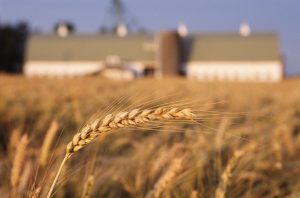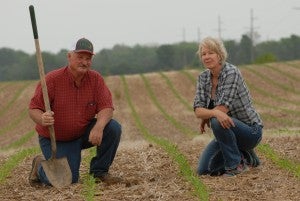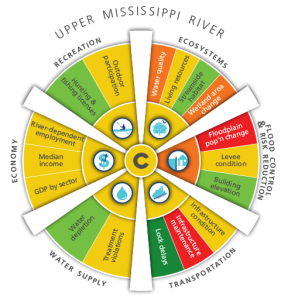The National Corn Growers Association (NCGA), which represents the interests of 300,000 U.S. corn farmers, recently approved more than a dozen climate policies as part of the policy positions its members vote on twice a year. In doing so, NCGA affirmed that climate change is real, and farmers are part of the solution. Read More
Growing Returns
Selected tag(s): National Corn Growers Association
This partnership between environmentalists and corn growers is breaking new ground
Throughout Environmental Defense Fund’s history and my nearly two decades of working on our agriculture team, collaborations with unlikely allies have proven to be a powerful, necessary way to unleash transformative sustainability solutions.
It’s in that spirit that EDF has partnered with the National Corn Growers Association (NCGA), which represents the interests of more than 300,000 corn farmers, to address one of the most pressing challenges facing our food and agriculture system – how to improve environmental outcomes while optimizing crop productivity and economic performance.
This partnership marks the first time an environmental nonprofit and commodity crop association have joined forces at this scope and scale. Here’s how it came about and what we’ve committed to tackle together. Read More
Four near-term market and policy opportunities for increasing agricultural resilience
Every day farmers across the U.S. face unprecedented pressures from a variety of factors, including policy and regulations, markets and trade, and variability in input costs. With extreme weather becoming a new normal and the global population climbing toward 11 billion people by 2100, it is imperative that we build a food and agriculture system that can absorb and recover from these stresses.
This summer, Environmental Defense Fund, National Corn Growers Association and Farm Journal Foundation convened a stakeholder dialogue about the challenges facing the agriculture industry and recommended paths forward.
A new white paper [PDF] summarizes key findings from the discussion, which also included ideas for better equipping farmers with the tools and incentives they need to identify and adopt climate-smart solutions.
Here are four policy and market opportunities that can help boost agricultural resilience. Read More
How a farmer ‘think tank’ is shaping agricultural sustainability, far beyond the field
One of the best parts of my job at Environmental Defense Fund is working with our farmer advisory network – a group of 19 producers who farm across the Corn Belt and Great Plains on operations ranging in size from about 5,000 acres to 30,000 acres.
They’re brilliant business people who know how conservation can benefit their bottom line. With their guidance, we’re making real progress aligning economic and environmental outcomes for agriculture.
Here’s how this unique partnership came about, and three of the most important areas of progress we’ve made through our collaboration over the past eight years. Read More
A call to help us strengthen the economic case for sustainability practices

Visiting my friend and Iowa corn farmer, Tim Richter.
Before installing a new heating system for your home, you’d want to conduct an analysis to make sure it’s worth the money, right? The same logic applies to farming – before a producer considers implementing conservation practices or new technologies, he or she will need to know how those practices will affect an operation’s bottom line.
Despite some good anecdotal information and several isolated field trial studies, the reality is we don’t have nearly enough information on the economic impacts – good or bad – of individual conservation practices. That means we cannot yet make an ironclad business case that will persuade the majority of farmers to implement conservation practices.
There are several key reasons for the dearth of information, and that’s partly my fault.
I’m hoping you can look past this and consider my call to work together to collect the necessary data to strengthen the case. Our food, livelihoods and landscapes depend on it. Read More
Conservation relies on profitability
 Whether in agriculture or any other business, if you don’t have enough money coming in to pay the bills, it’s hard to find the time or resources for anything other than working to turn a red budget spreadsheet black.
Whether in agriculture or any other business, if you don’t have enough money coming in to pay the bills, it’s hard to find the time or resources for anything other than working to turn a red budget spreadsheet black.
A wheat farmer friend from Washington recently told me that current prices are $4/bushel, the same as 40 years ago. Take into account inflation, and that’s a significant decline. Nationally, the USDA predicts that net farm income will drop by almost 9 percent this year, the fourth year in a row of declines after reaching a record high in 2013. Farmers also face enormous volatility in income, with fluctuations in yield, demand, as well as crop and input prices.
It’s no surprise then that environmentalists’ calls to cut crop insurance, disaster programs or other conservation payments fall on deaf ears in the agricultural community – or serve only to raise blood pressure levels across the Corn Belt. Read More
A coalition of uncommon bedfellows is bringing sustainable agriculture to scale
 Today represents a huge advancement for sustainable agriculture, and a new era of food company collaboration. At the Farm Progress Show in Boone, Iowa, we are officially launching the Midwest Row Crop Collaborative (MRCC): a diverse coalition working to expand on-the-ground solutions to protect air and water quality, enhance soil health, and maintain high yields throughout the Upper Mississippi River Basin.
Today represents a huge advancement for sustainable agriculture, and a new era of food company collaboration. At the Farm Progress Show in Boone, Iowa, we are officially launching the Midwest Row Crop Collaborative (MRCC): a diverse coalition working to expand on-the-ground solutions to protect air and water quality, enhance soil health, and maintain high yields throughout the Upper Mississippi River Basin.
Founding members of the MRCC include Cargill, Environmental Defense Fund, General Mills, Kellogg Company, Monsanto, PepsiCo, The Nature Conservancy, Walmart, and World Wildlife Fund. The coalition will work directly with growers to help foster continuous improvement and implement conservation activities across three pilot states responsible for 44 percent of corn, soy, and wheat production in the United States: Illinois, Nebraska, and Iowa. Read More
Collaboration can save the Mississippi River watershed
By Suzy Friedman, Director, Agricultural Sustainability, Environmental Defense Fund and Max Starbuck, Director, Market Development, National Corn Growers Association
Today, a diverse group of more than 400 businesses, associations, government agencies, science organizations, academic institutions and non-profit organizations released the first-ever report card evaluating the condition of one of our nation’s most storied and central waterways. This effort, known as America’s Watershed Initiative, was undertaken to provide information on the challenges facing the waters and lands that make up the 31-state Mississippi River Watershed and the 250 rivers that flow into it.
The overall mark was less than stellar, a D+. However, the process of grading has yielded a pathway to improvement.
Why the poor rating? The watershed continues to experience increased pressure from the demands of urbanization, agriculture, transportation and land development.
Fortunately, moving from a “D+” to an “A” grade is achievable – with new levels of understanding and collaboration. That’s why the Environmental Defense Fund and the National Corn Growers Association have a real desire to work together on this and similar initiatives. Read More











